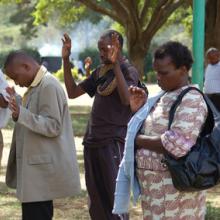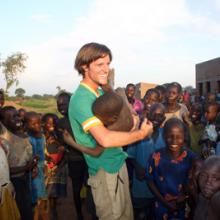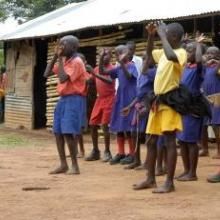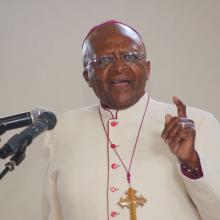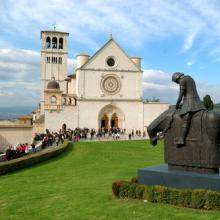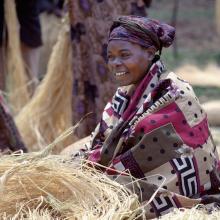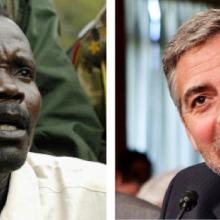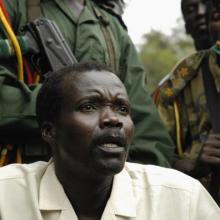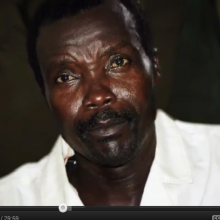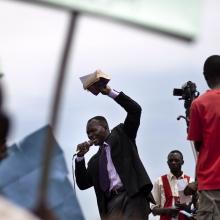Uganda
At prayer healing services in some Pentecostal churches, pastors invite people infected with HIV to come forward for a public healing, after which they burn the person’s anti-retroviral medications and declare the person cured.
The “cure” is not free, and some people say they shell out their life savings to receive a miracle blessing and quit taking the drugs.
“I believe people can be healed of all kinds of sickness, including HIV, through prayers,” said Pastor Joseph Maina of Agmo Prayer Mountain, a Pentecostal church on the outskirts of Nairobi. “We usually guide them. We don’t ask for money, but we ask them to leave some seed money that they please.”
But the controversial ceremonies are raising red flags as believers’ conditions worsen, and a debate has opened over whether science or religion should take the lead in the fight against the AIDS epidemic.
A campaign to arrest an African warlord generated awareness in more ways than the effort’s co-founder Jason Russell could have ever imagined.
The “Kony 2012″ campaign captured widespread attention for its push to arrest Joseph Kony, head of the Lord’s Resistance Army, which abducts and forces children to become soldiers. For a grass-roots video project that suddenly went viral, it was a phenomenal success.
Two weeks after the group Invisible Children released the video last year, Russell, the group’s co-founder, was detained and hospitalized for erratic behavior after he was found running naked and cursing the devil in the streets of San Diego.
I’VE WINCED often at the portrayal of religion in recent documentaries—partly out of embarrassed identification with some of the apparently crazy things I’ve witnessed in real life, and partly because some documentarians seem to think that there’s nothing to religion other than those crazy things. God Loves Uganda, a new documentary about the role played by U.S. missionaries in nurturing that country’s homophobic culture and legislation, manages to avoid the mistake of confusing bad religion with all religion.
The concern for the Ugandan people manifested by fundamentalist charismatic Christians is suggested to be far less than the sum of its parts as they become participants in the nurturing of a social structure that aims to eradicate gay people. But the film avoids easy stereotyping of Christian mission work, particularly in the person of Bishop Christopher Senyonjo, a smiling radical in the mold of Desmond Tutu. His is a face of Ugandan Christianity that is open, generous, alive, courageous, and kind—a prophetic African voice for human rights.
Wendell Berry recently suggested that the expression of anti-LGBTQ sentiment may evoke a kind of subconscious reaction in the proponent akin to autoerotic pleasure. Delighting in the pain of others is a kind of sadism rooted in the insecurities harbored by the person who has decided it’s their job to be the moral police, despite how kind they may think they are being. The fear stirred by psuedo-Dominionist movements may have given the U.S. missionaries in God Loves Uganda a sincere desire to change the world. But their lack of self-reflection leads them to export some of the worst of American cultural imperialism: prejudice, the conflation of sentimentality and cultural ignorance with love, the denial of the gift that the other has for us.
When Ugandan parliament member, David Bahati, introduced the so-called “Kill the Gays Bill” in 2009, many Americans were shocked, including a group of 60 ecumenical Christian leaders who released a statement deploring the bill.
But as Frank Mugisha told Sojourners magazine earlier this year, what is perhaps more upsetting, albeit little known, is the level of influence American evangelicals have had in crafting Uganda’s violent homophobia.
Academy Award-winning director Roger Ross Williams hopes to put this issue front and center with his new film God Loves Uganda, which made its Washington, D.C., premiere Tuesday night at the Human Rights Campaign headquarters.
The film opens with Rev. Kapaya Kaoma, an Episcopal priest from Boston by way of Zambia, who went to Uganda in 2009 to study the relationship between American conservatives and the Ugandan people. What he found was that “religion was being used to demonize and even to kill.”
Bio: Executive director of Sexual Minorities Uganda, which works for full legal and social equality in the country, and recipient of the 2011 Robert F. Kennedy Human Rights Award. www.sexualminoritiesuganda.net
1. What’s your response to the letter U.S. religious leaders signed last year, which condemned the “Anti-Homosexuality Bill” before Uganda’s Parliament because it “would forcefully push lesbian, gay, bisexual, and transgender (LGBT) people further into the margins”?
Uganda is a very Christian country. About 85 percent of our population is Christian—Anglican, Catholic, and Pentecostal. So for religious leaders to speak out against the Ugandan legislation, that is very important for me and for my colleagues in Uganda, because it speaks not only to the politicians and legislators, but also to the minds of the ordinary citizens.
It is very important to have respected religious leaders involved, including Archbishop Desmond Tutu, because these are leaders who have spoken out on other human rights issues such as apartheid, women’s rights, and slavery. And for us, for the voice of LGBT rights, to join with these other issues clearly indicates that our movement is fighting for human rights.
Fresh Vintage
Cody ChesnuTT's Landing on a Hundred is a classic soul album, from the infectious grooves and vocals to recurrent themes of personal and social redemption (comparisons include Marvin Gaye and Curtis Mayfield). Vibration Vineyard
Reclaimed Voices
A team of actors, playwrights, and activists help Ugandan teens, many of them survivors of abduction by the Lord's Resistance Army, courageously share their stories with their community—and, through the documentary After Kony: Staging Hope, with the world. First Run Feature
EACH DAY REV. JAMES BYENSI seeks the face of God in one of the world’s deadliest places, an environment where rape has been used as a weapon, children have had their innocence stolen, and the church of Jesus Christ is called to stand in the gap.
He lives in Bunia, a town on the eastern edge of the Democratic Republic of Congo (DRC). And while only the largest events of the DRC’s conflict—such as the M23 militia’s takeover of Goma, a city 300 miles south of Bunia—make world headlines, every day Byensi engages his community and country as an active agent of peace. For example, recently he helped deter a cycle of violence from escalating in his hometown. “Even as I write, I have just received a call from the mayor to join him in talking to a group of people who are protesting against the killing of their brother last night,” Byensi told Sojourners in October in one of several email interviews. “The killers were one of the rebel groups operating in the area surrounding Bunia.” While advocacy against violence is a cause close to Byensi’s heart, the protest itself threatened to become part of the problem: “Protest in this area is always violent and followed by looting or even rape,” he explained. The result of that meeting was that Byensi and the mayor together “devised the way to address the people and cool them down,” which included the mayor’s office helping the bereaved citizens with burial expenses.
That is the kind of advocacy and justice work Byensi does on a daily basis as a leadership and conflict-management consultant and trainer, and through the nonprofit he founded, the Rebuilders Ministry.
NAIROBI, Kenya — Nobel Laureate Archbishop Desmond Tutu on Tuesday urged Uganda to scrap a controversial draft law that would send gays and lesbians to jail and, some say, put them at risk of the death penalty.
The Anti-Homosexuality Bill is expected to become law after Parliamentary Speaker Rebecca Kadaga offered it to Ugandans as a "Christmas gift." The bill is believed to exclude the death penalty clause after international pressure forced its removal, but gay rights activists say much of it is still horrendous.
“I am opposed to discrimination, that is unfair discrimination, and would that I could persuade legislators in Uganda to drop their draft legislation, because I think it is totally unjust,” Tutu told reporters here on Tuesday at the All Africa Conference of Churches meeting.
The Ugandan Parliament has re-introduced a draconian anti-LGBT bill that has received widespread international criticism. Under this bill, first introduced in 2011 and re-introduced earlier this year, the government would prescribe the death penalty to all LGBT people and those that provide them with housing and resources.
The bill is expected to pass before the end of this year; its champions call it a “Christmas gift to the Ugandan people.”
In the face of this hatred, I am glad to work for Sojourners, which earlier this year signed on to the following statement along with other Christian groups:
Our Christian faith recognizes that all human beings have been created in the image and likeness of God, and Christ teaches that we are to love our neighbors as ourselves. All acts of bigotry and hatred betray these foundational truths … Regardless of the diverse theological views of our religious traditions regarding the morality of homosexuality, the criminalization of homosexuality, along with the violence and discrimination against LGBT people that inevitably follows, is incompatible with the teachings of our faith.
ASSISI, Italy — Swimming against a global tide of religious violence and political polarization, about 550 religious and humanitarian leaders met recently here in the birthplace of St. Francis to propose a new way forward: love and forgiveness.
The ambitious aim of the Sept. 19-23 “Global Gathering” was nothing short of putting those values to work in some of the most hate-filled and unforgiving places on Earth. Following the example of Francis, whose feast day is on Thursday, participants pledged to make lofty ideals real through dozens of creative projects researched and funded by the Michigan-based Fetzer Institute, the conference convener.
“There’s a power in love that our world has not discovered yet,” said Fetzer President and CEO Larry Sullivan, quoting the Rev. Martin Luther King, Jr. “Let’s put our backs into the work of love and forgiveness.”
This week, I and many U.S. Christian leaders signed on to a letter, concerning a re-introduced version of Uganda’s Anti-Homosexuality Bill, a bill which perpetuates some alarming and hateful language about the LGBT community in Uganda, and indeed, around the world. When it was originally introduced in 2009, it made homosexuality an act punishable by death. While the most draconian measures have been removed, the bill still calls for life imprisonment for people who are homosexual, and makes even discussions about sexual orientation illegal, stifling any opportunity to build a civil and constructive dialogue. How can we expect to come together to bridge the divides if we cannot even bring ourselves to sit down together and talk? What is even more heartbreaking, so surprising, is that Christian leaders in Uganda continue to support it.
What are we calling for in this letter? It is a simple message, and one that all who profess a Christian faith should be able to agree with:
All human beings have been created in the image and likeness of God, and Christ teaches that we are to love our neighbors as ourselves. All acts of bigotry and hatred betray these foundational truths.
Stories like this one remind me that listening to women’s voices can be a matter of life and death, and not in the whole “Adam-listened-to-Eve” type of way.
Impassioned women of all ages are petitioning Uganda’s highest court to declare that “when women die in childbirth it is a violation of their rights.” So far, their bids in the lower courts have been unsuccessful, but they’re pressing on.
$60 million.
That’s what it would take to hire enough medical workers to meet Uganda’s needs—specifically, to staff village health clinics that lack people and supplies to the degree that an estimated 16 pregnant women die needlessly each day.
The BBC reports that Caesar Achellam was captured by the Ugandan army on Saturday:
George Clooney and others were arrested on the steps of the Sudanese embassy last week to call attention to the violence in South Sudan. The actor-activist, along with Jon Prendergast, testified before the Senate Foreign Relations committee and conducted a series of media interviews to explain the situation in South Sudan, the world’s newest nation.
I applaud Clooney for using his star power to shine a light on the violence in South Sudan. Now that we see the problem the question for us is: what does this situation require of me personally?
Similarly, when we watch the Kony 2012 video that, for all of its flaws, informs people about the crimes against humanity of Joseph Kony and the efforts to bring him to justice, the same question arises.
The world is full to the brim with tragedy. We see the violence in Syria, people protesting their government are killed by their own government. We see world leaders who cannot come to consensus about the right thing to do.
What action will at once end the violence, protect the people, and depose an illegitimate government while not increasing violence in a complicated and volatile region of the world?
"Mainly it seems the media is just annoyed that it took this guy to get people to listen...'I mean, we're handsome, we're on TV. Why won't Rhianna retweet our stories on Kony?'"
Amidst controversy over the viral 'Kony 2012' video produced by Invisible Children, Bono lent his words of support in Ireland's Sunday Times edition. Below are his comments:
“Having just been in Gulu with Edun and Jolly, this is particularly pertinent for me … Spreading like wildfire, and sparking a heated, fascinating, much needed debate, this is brilliant campaigning. Not only does the public now know about Kony and his most despicable atrocities, they also know what a huge range of experts think about it, even if they all don’t agree. I salute a strategy that generates this much interest if it¹s targeted towards lasting meaningful solutions owned and directed by the people of the region on their journey from the trauma of these atrocities towards stability and development. Is there an Oscar for this kind of direction? Jason Russell deserves it.”
“Nothing is more powerful than an idea whose time has come.”
So begins the Invisible Children’s KONY 2012 video that recently went viral. And yet, I would perhaps change this opening quote to say something like, “Nothing is more powerful than the stories by which we construct our identities,” because these stories determine who you believe you are and how you believe you can engage in the world and with others.
Powerful. Potentially dangerous. Always in some way failing in it’s accuracy and exclusive to someone else. Even with our best intentions.
Invisible Children released a short film Wednesday with the aim to make Joseph Kony, leader of the Lord's Resistance Army in Uganda, famous--not for acclaim, but to bring awareness to his alleged crimes in abducting children and forcing them to be child soldiers.
According to the YouTube video, "KONY 2012 is a film and campaign by Invisible Children that aims to make Joseph Kony famous, not to celebrate him, but to raise support for his arrest and set a precedent for international justice."
"It's obvious that Kony should be stopped. The problem is that 99 percent of the planet doesn't know who he is. If they knew, Kony would have been stopped long ago," the half-hour film narrates.
CORRECTION: After our original post ran yesterday, we learned that there has been some confusion over the language of the current proposed language of the Ugandan anti-gay bill. In fact, the death penalty has not yet been dropped from the text of the bill.
According to news reports, a Ugandan Member of Parliament has introduced a revised bill that is expected to be acted on within a few days.
Tomatoes. Uganda. Fair Trade. Here's a little round up of links from around the Web you may have missed this week:
- Are you living in a food desert? Here's a map that will tell you.
- Stop the hate in Uganda.
- This Saturday is World Fair Trade day. (What is fair trade, you ask?)
- The U.S. Conference of Catholic Bishops asks Senator John Boehner for a budget that "reduces future deficits, protects the poor and vulnerable people, advances the common good, and promotes human life and dignity."
- Continue praying for Egypt.
- Mark Bittman visits Immakolee, Florida, America's tomato capital.
- Easy Korean cooking for beginners.
- A cheerful video for you: coffee time.
